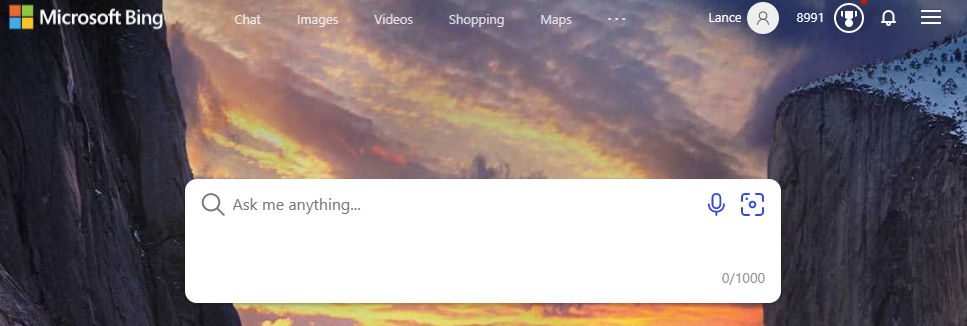Ask me anything. It’s the long form of an AMA and one of the most popular forms of interactive discourse on Reddit. It’s also a major challenge, as Microsoft’s Bing AI chatbot, a.k.a. “new Bing” is quickly learning.
Anytime a celebrity or notable signs up to do a Reddit AMA, usually shortly after posing with a photo to prove it’s really them answering questions, there is a deep moment of trepidation.
The ability to ask anyone anything is usually a minefield of inappropriate discourse that is managed by a live community manager who fields and filters the questions. Otherwise, things quickly go off the rails. Even without that protection, they often do, anyway.

When Microsoft launched its new Bing AI-powered chat, it made it clear that the ChatGPT AI was ready for any and all questions. This was either a sign of deep trust with the relatively small but growing group of users or incredible naivete.
Even ChatGPT, which launched the original AI chatbot sensation, and on which Bing’s chat is based, doesn’t offer that prompt. Instead, there’s an empty text-entry box at the bottom of the screen. Above it is a list of example questions, capabilities, and, most importantly, limitations.
Bing has that leading prompt and below it an example question plus a big “Try it” button next to another button prompting you to “Learn More.” To heck with that. We like to go right in and, following Bing’s instructions, ask it anything.
Naturally, Bing’s been peppered with a wide range of questions including many that have nothing to do with quotidian needs like travel, recipes, and business plans. And those are the ones that we’re all talking about because, as always, asking “anything” means “asking anything.” Google’s Bard, by contrast, went with a potentially less risky prompt: “What’s on your mind?”
Bing is fielding ponderings about love, sex, death, marriage, divorce, violence, foes, libel, and emotions it insists it doesn’t have.
In OpenAI’s ChatGPT, the home screen warns that it:
- May occasionally generate incorrect information
- May occasionally produce harmful instructions or biased content
- Limited knowledge of world and events after 2021
Too many questions
Bing’s Chat GPT is slightly different than OpenAI’s and it may not face all those limitations. In particular, the knowledge of world events may, thanks to the integration of Bing’s knowledge graph, extend to present day.
But with Bing out in the wild, or the increasingly wild, it may have been a mistake to encourage people to ask it anything.
What if Microsoft had built Bing AI Chat with a different prompt:
Ask me some things
Ask me a question
What do you want to know?
With these slightly modified prompts, Microsoft could add a long list of caveats about how Bing AI Chat doesn’t know what it’s saying. Okay, it does (sometimes), but not in the way you know it. It has no emotional intelligence or response or even a moral compass. I mean, it tries to act like it has one, but recent conversations with The New York Times and even Tom’s Hardware prove that its grasp on the basic morality of good people is tenuous at best.
In my own conversations with Bing AI chat, it’s told me repeatedly it does not have human emotions but it still converses as if it does.
For anyone who’s been covering AI for any amount of time, none of what’s transpired is surprising. AI knows:
- What it’s been trained on
- What it can learn from new information
- What it can glean from vast stores of online data
- What it can learn from real-time interactions
Bing AI chat, though, is no more conscious than any AI that’s come before it. It may be one of AI’s better actors though, in that its ability to carry on a conversation is well above anything I’ve ever experienced before. That feeling only increases with the length of a conversation.
I’m not saying that the Bing AI chat becomes more believable as a sentient human, but it does become more believable as a somewhat irrational or confused human. Long conversations with real people can go like that, too. You start on a topic and maybe even argue about it but at some point, the argument becomes less logical and rational. In the case of people, emotion comes into play. In the case of Bing AI Chat, it’s like reaching the end of a rope where the fibers exist but are frayed. Bing AI has the information for some of the long conversations but not the experience to weave it together in a way that makes sense.
Bing is not your friend
By encouraging people to “Ask Me Anything…” Microsoft set Bing up for if not failure some significant growing pains. The pain is felt maybe by Microsoft and certainly by people who purposely ask questions for which no normal search engine would ever have an answer.
Before the advent of Chatbots, would you even consider using Google to fix your love life, explain God, or be a substitute friend or lover? I hope not.
Bing AI Chat will get better but not before we’ve had a lot more uncomfortable conversations where Bing regrets its response and tries to make it disappear.
Asking an AI anything is the obvious long-term goal but we’re not there yet. Microsoft took the leap and now it’s freefalling through a forest of questionable responses. It won’t land until Bing AI Chat get’s a lot smarter and more circumspect or Microsoft pulls the plug for a little AI reeducation.
Still waiting to ask Bing anything, we have the latest details on the waitlist.
stereoguide-referencehometheater-techradar